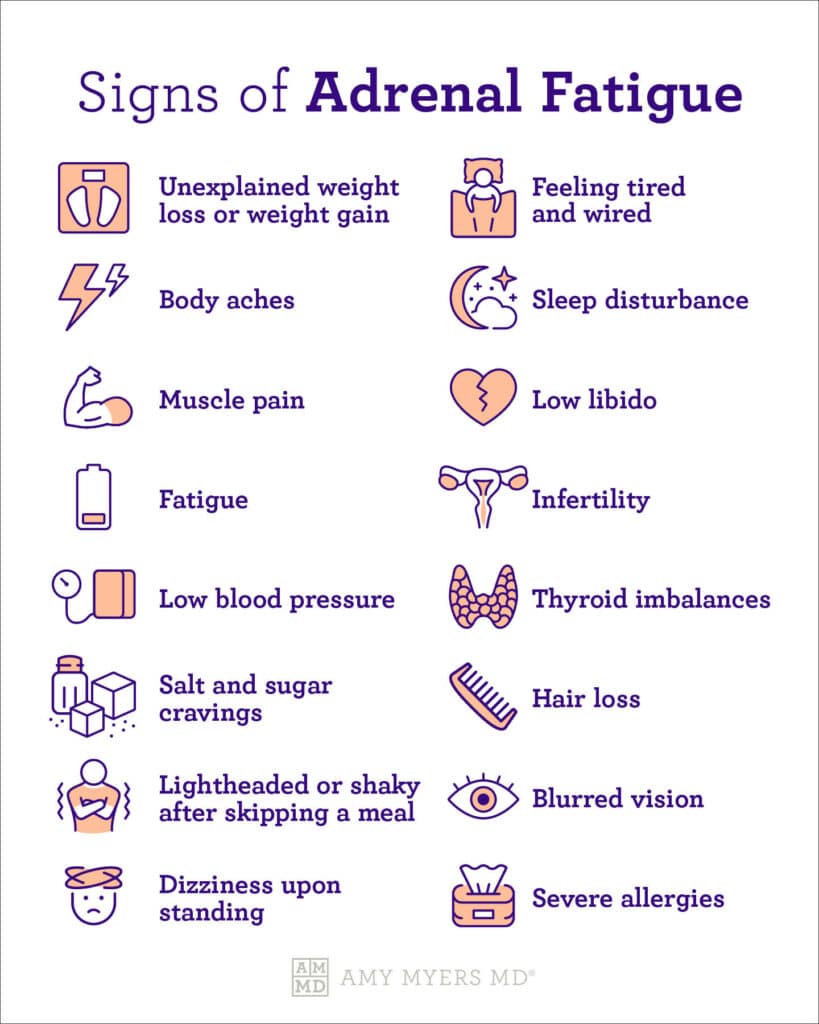We live in a stressful world. Stress is just a normal part of life; unfortunately, you can’t get away from it. From long work days, traffic, family demands, financial worries, and our on-the-go lifestyles, we tend to approach stress as part of everyday life. Constant stress leads to our adrenal glands being overworked, leading to adrenal fatigue. Yet, what is adrenal fatigue?
Some stress is necessary to keep your immune system sharp and keep you alive in dangerous situations. Historically, this was more important. Today, we aren’t running away from saber-tooth tigers or bears trying to eat us as our ancestors did. However, our modern lifestyles can still cause the switch to our stress response to be constantly on. Prolonged, relentless stress can contribute to adrenal fatigue, heart disease, leaky gut, anxiety, and many autoimmune diseases.
Your health is on a continuum. On one end, you have optimal health; on the other, you have a chronic illness. Your adrenal health works in the same way. You can be one step away from healthy and functioning or have full-blown Addison’s disease, an autoimmune disease where your immune system attacks your adrenal glands and damages your adrenal cortex. This insufficiency creates a considerable gap, and I find that many people fall somewhere within this spectrum, many with adrenal fatigue. So, what is adrenal fatigue?
What is Adrenal Fatigue?
To receive an Addison’s disease diagnosis, you must have lost 90% of your adrenal glands’ function.1 However you can still have adrenal insufficiency without this diagnosis of Addison’s disease. Anything between optimal health and Addison’s disease is referred to as adrenal fatigue. Adrenal fatigue is a mild form of adrenal insufficiency that occurs when your adrenal glands are over stressed.
The Role of Your Adrenal Glands
The primary role of your adrenal glands is to produce and regulate the stress hormone cortisol. Your adrenal glands also produce sex hormones (estrogen and progesterone) and neurotransmitters adrenaline (epinephrine), norepinephrine, and dopamine.
These hormones and neurotransmitters regulate your metabolism and communicate with other organs, such as your brain, kidneys, and reproductive system. However, chronic stress can suppress your adrenal glands and cause them to release insufficient amounts of these necessary hormones. When you’re feeling fatigued at work, you may not give 100% effort to it. Your adrenal glands work the same way when they are fatigued from being overworked due to chronic stress. Let’s look at common causes of stress that you may not have considered that’s causing your stress.
Causes of Stress
We live in a very stressful world. We work 80-hour weeks, sacrifice our sleep, drink two cups of coffee to stay awake during the day, and reach for sugary foods for more energy. These habits affect us emotionally, mentally, physically, and spiritually. Some common causes of stress include:2
- lack of sleep
- poor diet (processed, junk food)
- stimulants (caffeine, sugar)
- rigorous work schedule
- emotional trauma (unhealthy relationships, death of a loved one)
- overtraining (marathons, training without rest days)
- lack of fun and excitement
As I mentioned, your adrenal glands release cortisol to respond to stress. Cortisol is your body’s primary stress hormone and has many functions. However, too much cortisol can become a problem. Let’s quickly review cortisol and its roles in your body.
Cortisol: The Primary Stress Hormone
When you engage in stressful activities, your body enters into fight-or-flight mode, believing it needs a surge of energy to survive. Cortisol’s primary function is to give you a burst of energy to survive a threat. By doing so, it needs a simple sugar for energy, which makes you crave surgery snacks when stressed.
Indirect effects of this burst of cortisol are an increase in blood glucose levels and a suppression of your immune system. Over time, high cortisol levels can lead to insulin resistance and weaken your immune system response.
Signs of Adrenal Fatigue
As you’ve likely figured out, the optimal function of your adrenal glands is essential for a healthy stress response. Yet, your adrenal glands do so much more because they produce so many different hormones.
 Dr. Amy Myers
August 14th, 2022
https://content.amymyersmd.com/article/adrenal-fatigue/Signs of Adrenal fatigue – Infographic – Amy Myers MD®
Dr. Amy Myers
August 14th, 2022
https://content.amymyersmd.com/article/adrenal-fatigue/Signs of Adrenal fatigue – Infographic – Amy Myers MD®There are several signs of adrenal fatigue, yet if you’re feeling fatigued, have body aches, or you need caffeine or reach for sugary snacks for energy, that’s a good indicator that you might have adrenal fatigue.
Don’t worry; there are ways to treat adrenal fatigue and get your adrenal glands functioning optimally. To treat adrenal fatigue, you must get to the root cause. And you guessed it – the root cause is stress.
The Adrenal and Thyroid Connection
Cortisol functions in a negative feedback loop with the hypothalamus and pituitary gland. Once it enters your bloodstream, its presence signals to your hypothalamus and pituitary gland to slow down so that they don’t trigger any additional stress hormones. The hypothalamus and pituitary gland also regulates thyroid hormone production, so that slows down as well. Here’s how the adrenal glands and thyroid are connected.
Adrenal Fatigue is Harmful to The Thyroid
To recap, your adrenal glands produce hormones that impact your major metabolic processes, just as your thyroid does. Adrenal fatigue is the negative effect of experiencing chronic stress that puts your adrenals on overdrive for extended periods of time. The flooding and eventual plummeting of stress hormones has many negative impacts on the thyroid.
Stress hormones affect the enzymes that convert T4 to T3. Free T3 (FT3) is the active form of the hormone that I like to think of as the ‘gas.’ Reverse T3 (RT3) is the inactive form of the hormone that I like to think of as the ‘brakes.’ When stress is high we convert more of our T3 into RT3 rather than FT3. This imbalance essentially puts the brakes on all of your metabolic processes, slowing them down and causing hypothyroid symptoms.
Adrenal Fatigue Promotes Thyroid Hormone Resistance
Adrenal fatigue is also known to increase your thyroid hormone resistance. Inflammatory immune cells called cytokines are released in the stress response, which make thyroid receptors less sensitive to thyroid hormones. This means that even if you’re taking thyroid medication and your thyroid hormone levels are normal, you can still be suffering from underactive thyroid symptoms.
Adrenal Fatigue Suppresses The Immune System
Meanwhile, your immune system is suppressed so your body can focus on overcoming the stressor, and partially because stress causes inflammation. This causes your immune system to slow down to prevent a state of chronic inflammation. When your immune system is stressed, you become more susceptible to viral infections, some of which can trigger autoimmune thyroid disease.
Adrenal Fatigue Testing
Since we live in a toxic, high-stress world, I assume that most people have some amount of adrenal fatigue. The primary way to test for adrenal fatigue is through testing stress hormone levels at four different points throughout the day. You can order an at-home cortisol test from LetsGetChecked and review your results with a functional medicine doctor.
I also recommend testing your thyroid hormone levels, specifically T3 and T4 levels. LetsGetChecked also has a full thyroid panel that you can do in the privacy of your home. I believe the most optimal thyroid levels are:
- TSH levels of 1-2 UIU/ML or lower (Armour or compounded T3 can artificially suppress TSH)
- FT4 levels >1.1 NG/DL
- FT3 levels > 3.2 PG/ML
- RT3 levels < 10:1 ratio RT3:FT3
- TPO – TgAb levels < 4 IU/ML or negative
Once you’ve determined that you have adrenal fatigue you can make the necessary dietary and lifestyle changes to treat it. Let’s talk more about how to treat adrenal fatigue.
How to Treat Adrenal Fatigue
To treat adrenal fatigue, you must get to the root cause. The underlying cause of adrenal fatigue is stress. The first step is to figure out where your stress is coming from and learn ways to reduce it. Here are my suggestions for supporting a healthy stress response.
- Establish a Routine: Having a routine can help you maintain a sense of normalcy and focus. Go to bed at the same time every night (preferably before 10 pm) and eat your meals at the same time every day.
- Find a relaxing activity and do it every day: Some of my favorite ways to relax are to get in my Sunlighten infrared sauna, take a walk with my family, do yoga, go swimming with my daughter, Elle, or take a hot bath with homemade bath salts.
- Optimize your diet: Eliminate caffeine, alcohol, processed sugar, gluten, and dairy from your diet.
- Say no: If you feel stressed and feel there is a high demand on your time, learn to say no. Make time for yourself a priority.
- Move your body: Set aside time for exercise. It doesn’t have to be high-intensity every day. Just 30 minutes of movement can help reduce stress.
Using these methods to promote a healthy stress response is the first step to treating adrenal fatigue. Giving your adrenal glands added support is the next step.
Support Your Adrenal Glands
Chronic stress causes your body to go through essential micronutrients quicker, which could leave not enough for crucial body processes. Vitamin C, magnesium and B vitamins, antioxidants, and more are all involved in producing stress hormones. Many adults already have suboptimal or insufficient levels of these micronutrients needed to produce stress hormones.
By giving your body the support it needs, you can treat the symptoms of adrenal fatigue and promote a healthy stress response.
Adrenal Support is my No. 1 tool for adrenal fatigue. It contains a blend of adaptogenic herbs such as Rhodiola Rosea, Panax ginseng, Eleuthero, and ashwagandha) that facilitate a stress response and support healthy cortisol levels. I’ve also included the amino acid L-Tyrosine in Adrenal Support to support catecholamine production, essential for an optimal stress response.
For added support, I recommend The Myers Way® Multivitamin. It contains optimal levels of B vitamins, magnesium, and vitamin C needed for producing stress hormones.
Stress is just a normal part of life. You cannot avoid it. If you’re feeling like it’s hard to get through your daily life, you might have adrenal fatigue. Using these tools, and understanding what is adrenal fatigue can help get to the root cause and take back your health.
FAQs About Adrenal Fatigue
What is adrenal fatigue?
What is adrenal fatigue?
Adrenal fatigue is a form of adrenal insufficiency that occurs when your adrenal glands are over stressed. Anything between optimal health and Addison’s disease is referred to as adrenal fatigue.
What causes adrenal fatigue?
What causes adrenal fatigue?
The most notable cause for adrenal fatigue is chronic stress. When you engage in stressful activities, your body enters into the fight-or-flight mode, where it believes that you need a surge of energy in order to survive. Unfortunately, your body isn’t made to be in this fight-or-flight mode all the time. When it is, your adrenal glands become tired and stop working optimally.
Can you heal adrenal fatigue naturally?
Can you heal adrenal fatigue naturally?
The best way to reverse your adrenal fatigue is to reduce your stress. Small amounts of stress is natural, but long-term stretches of non-stop stress will do more damage. Try getting optimal sleep, eating a diet of unprocessed foods and no added-sugar, cut back on your caffeine and alcohol intake, reduce your rigorous work schedule, heal emotional trauma and seek a therapist if these issues are on-going. Lastly, have some fun! Engaging in activities that bring you joy is an easy way to reduce your stress levels and heal your adrenal fatigue naturally.
Article Sources
- Addison's disease. Mayo Clinic. 2022.
- Stress: Signs and Symptoms. Cleveland Clinic. 2022.
